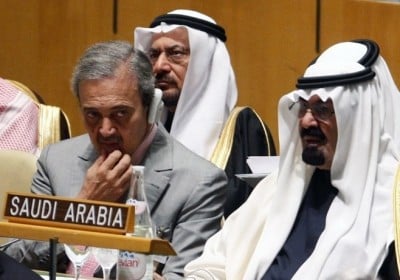Saudi Arabia Turns Down UN Security Council Seat

In an unprecedented move, Saudi Arabia last Friday indicated that it intended to turn down the temporary seat on the UN Security Council to which it was elected last week. While couched in general terms, its statement of protest points to deep concerns in the Saudi regime, a longstanding American ally, that the US is cutting across its interests in the Middle East.
The decision clearly came from the highest levels. The Saudi ambassador to the UN, Abdallah Al-Mouallimi, initially welcomed his country’s seat on UN’s top body, only to be countermanded by a statement from the Saudi Foreign Ministry, which castigated the UN for its “double standards.”
The statement focussed in particular on the UN Security Council’s “inability to perform its duties” to end the war in Syria, declaring that the UN’s inaction had allowed the Syrian regime “to kill its people and burn them with chemical weapons in front of the entire world and without any deterrent or punishment.”
The accusations against President Bashar al-Assad’s Syrian government are a repetition of the lies about the August 21 chemical weapons attack near Damascus that was exploited by the US as it prepared to devastate Syria in early September. The Obama administration’s decision to temporarily pull back from the air strikes in the face of overwhelming public opposition clearly angered Riyadh.
Saudi Arabia has been intimately involved in funding and arming US-backed Islamist opposition inside Syria. Evidence also points to the involvement of Saudi intelligence in staging the chemical weapons atrocity, to provide the excuse for a US-led war. In early August, Saudi intelligence chief Bandar bin Sultan met with Russian President Vladimir Putin in a bid to pressure Moscow to drop its support for Assad. When Putin refused, Bandar warned that the situation in Syria would “intensify” and predicted that there was “no escape from military action” (see “Saudi-Russian talks raise questions on Syrian war drive, Boston bombings).
Three weeks later, the chemical weapons attack provided the pretext that the US had been seeking. A report on August 29 by Associated Press reporter Dale Gavlak and independent journalist Yahya Ababed provided substantial evidence that Syrian opposition militias had carried out the attack, using chemical weapons provided by Saudi Arabia (see: “Report links US-backed Syrian opposition to Ghouta gas attack”). Unlike the Assad regime, Riyadh had a clear motive: it wanted to involve the US in the Syrian war in order to reverse the military setbacks inflicted on the Al Qaeda-linked opposition militias.
The Saudi decision to reject the UN Security Council seat is not the only indication of bitterness over the US decision to postpone an attack on Syria. During the UN session last month, Foreign Minister Prince Saud al-Faisal staged his own protest by declining to give a customary speech to the general assembly.
Saudi Arabia was not only dismayed by the deal struck between the US and Russia to avert immediate military action against Syria, but also by the Obama administration’s steps toward negotiations with Iran over its nuclear programs. However unlikely, the last thing that Riyadh wants is a rapprochement between Washington and Tehran. Former US ambassador to Saudi Arabia, Robert Jordan, told Reuters this month: “The Saudi’s worst nightmare would be the [Obama] administration striking a grand bargain with Iran.”
Reflecting the thinking in Saudi ruling circles, Abdullah al-Askar, foreign affairs committee chairman of the country’s advisory body, told Reuters: “I am afraid in case there is something hidden. If America and Iran reach an understanding it may be at the cost of the Arab world and the Gulf states, particularly Saudi Arabia.”
The Saudi autocracy has always regarded Iran as its chief rival for regional influence. It backed the Iraqi regime of Saddam Hussein in its war with Iran in the 1980s and was deeply concerned when the 2003 US-led invasion of Iraq led to the emergence of a Shiite-dominated government in Baghdad with connections to Tehran.
As revealed in a 2008 WikiLeaks cable, Saudi King Abdullah exhorted top US officials “to cut off the head of the snake” and use Tehran’s nuclear programs as the pretext for a war on Iran. With Washington’s tacit support, Riyadh has whipped up anti-Shiite sectarianism and assisted reactionary Sunni extremists in the Middle East in a bid to undermine Tehran’s allies in Iraq, Lebanon and Syria.
The autocratic regimes in Saudi Arabia and the Gulf states were deeply fearful of the revolutionary eruptions in Tunisia and Egypt. Saudi Arabia, together with Qatar, regarded the US-backed regime-change operation in Syria as an ideal opportunity to remove a key Iranian ally and to weaken Tehran. With Washington’s backing, both countries have provided arms and money to right-wing Syrian militias, including those linked to Al Qaeda.
In last Friday’s statement, Saudi Arabia also complained that the UN Security Council had failed to free the Middle East of “all weapons of mass destruction”—a reference to Israel’s stockpile of nuclear weapons, as well as Iran’s nuclear programs. Despite the lack of evidence supporting claims that Iran is building nuclear weapons, Saudi Arabia remains concerned and has hinted that it could launch a nuclear effort.
US Secretary of State John Kerry met yesterday with Saudi Foreign Minister al-Faisal in Paris in a bid to allay Saudi concerns and encourage it to take up its UN Security Council seat. Among Arab countries, Qatar publicly backed Riyadh’s decision, while the Arab grouping in the UN called on it to reconsider.
Whatever Saudi Arabia’s final decision, the episode has provided another revealing glimpse into the growing regional tensions and rivalries that the US interventions in the region have stoked up. While the Obama administration has stepped back from a war with Syria, for the time being at least, any new military action has the potential to set off the regional tinderbox that the US has created.

